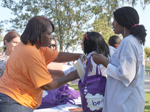|
More than 200
men, women, young adults and
children came out to North
Charleston's Riverfront Park for a
day of fun activities and
camaraderie to promote awareness
in the first Sickle Cell Walk and
Fun Run event held on Sept. 10.
The event recognizes September as
National Sickle Cell Disease
Awareness Month.
The walk and
run event was sponsored by the
Concerned Citizens of
Peninsula/Lowcountry as well as
parents of children diagnosed with
sickle cell disease. Proceeds from
the event were donated to the MUSC
Sickle Cell Clinic and related
research. Shamekei Gray, who is
the mother of two children with
sickle cell disease, was this
year's event organizer.
  MUSC Pediatric
Sickle Cell Clinic social worker
Joyce Rivers Miller, left,
stuffs some literature and
information into goodie bags
distributed at the Sept. 10
inaugural Sickle Cell Foundation
Walk/Fun Run. MUSC Pediatric
Sickle Cell Clinic social worker
Joyce Rivers Miller, left,
stuffs some literature and
information into goodie bags
distributed at the Sept. 10
inaugural Sickle Cell Foundation
Walk/Fun Run.
"I'm passionate
about promoting awareness for
sickle cell disease. When I walked
in the Arthritis Walk in 2010, the
experience inspired me to
coordinate a walk for sickle cell
disease. There are walks for all
kinds of illnesses, but not sickle
cell. It's a silent disease, and I
feel more people need to know more
about it," said Gray.
Sherron M.
Jackson, M.D., associate professor
of Pediatric Hematology/Oncology,
MUSC Children's Hospital, serves
as medical director of MUSC's
Pediatric Sickle Cell Clinic. The
clinic was founded in 1987 by
Jackson to provide medical care
for children diagnosed with sickle
cell disease. Jackson has treated
and cared for more than 500
patients and their families within
the 25 years since the clinic
opened. A compassionate caregiver,
Jackson has followed her patients
from infancy to adulthood as they
learned to manage a lifetime of
symptoms related to this disease
including chronic pain, fatigue,
risk for stroke, and sometimes
death.
A simple mantra
and belief drives Jackson and her
clinical team to continue with
their work: "The more children we
can help through the clinic; the
better the chance these children
can lead happy, healthy lives."
Sickle cell
disease is among a group of
inherited red blood cell disorders
where the body's red blood cells
become hard, sticky and have a
c-shaped appearance. Because
sickle cells die early, they are
responsible for a constant
shortage of red blood cells and
are the cause of other serious
problems. Currently, the only
known cure for sickle cell disease
is a bone marrow or stem cell
transplant.
In 1987,
Jackson was instrumental in
pushing a statewide mandate to
conduct sickle cell screening
tests on all newborns in South
Carolina. It's estimated that
about 30 newborns are diagnosed
each year with the disease. The
test identifies the newborn's
hemoglobin type. The baby's blood
from the screening test is shipped
to the Department of Health and
Environmental Control (DHEC) and
the results shared with physicians
and families within a few weeks to
determine if the child has the
trait or disease.
MUSC's Sickle
Cell Clinic, located in Rutledge
Tower, continues to serve new and
existing patients throughout the
Palmetto state. In 1994, the
clinic expanded to treat patients
monthly at the Waccamaw-Georgetown
area clinic only to close in 2009
because of DHEC budget cuts. To
help improve services for adults
living with sickle cell disease,
Jackson also supports the
recruitment of a new adult
hematology specialist who can help
in the treatment of adult patients
diagnosed with this
life-threatening disease.
According to
Jackson, adults with sickle cell
disease struggle to receive
adequate care because their
symptoms can become more complex.
With more services, awareness and
training of primary care
providers, adults can live more
comfortably and manage symptoms
associated with their disease.
Gray's simple
message as a mother of children
living with sickle cell disease
and a compassionate advocate may
say it best. "I look forward to
the day when my children can
someday be cured from sickle cell
disease. If not, I hope they'll
grow up to be fighters and
advocates who can speak for
themselves about their experiences
when they become adults. I want
them to say that they lived
through this disease," she said.
For information
about the MUSC Pediatric Sickle
Cell Clinic, call 876-0444.
|




 MUSC Pediatric
Sickle Cell Clinic social worker
Joyce Rivers Miller, left,
stuffs some literature and
information into goodie bags
distributed at the Sept. 10
inaugural Sickle Cell Foundation
Walk/Fun Run.
MUSC Pediatric
Sickle Cell Clinic social worker
Joyce Rivers Miller, left,
stuffs some literature and
information into goodie bags
distributed at the Sept. 10
inaugural Sickle Cell Foundation
Walk/Fun Run.